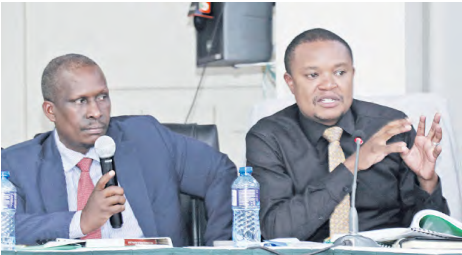

Consumers stare at a fresh increase
in the price of goods and commodities after a Parliamentary Committee declined to lower the Railway
Development Levy.
The National Assembly Finance and Planning Committee’s report on the Tax Laws (Amendment) Bill 2024 recommends the levy to be capped at two per cent, 50 basis lower than the initial proposal of 2.5 per cent and higher than the current rate of 1.5 per cent.
The levy is a tax on imported goods in Kenya that funds the construction and operation of the country’s standard gauge railway network.
The committee noted an earlier rate of two per cent charged before the past regime of President Uhuru Kenyatta lowered it to 1.5 per cent to ease the overall cost of doing business and living.
The Kimani Kuria-led team sought to balance revenue raising and creating a sustainable environment for businesses.
“The Committee has rejected proposal to retain Railway Development at 1.5 per cent. However, it proposes a lower rate of two per cent as opposed to the Bill’s proposed 2.5 per cent,’’ tabled report seen by the Star reads.
The recommendation by the Kuria-led committee is coming after various business stakeholders submitted that the increased levy would have pushed up the cost of imports, jeopardizing Kenya’s business activities.
A fortnight ago, the Shippers Council of Eastern Africa (SCEA) opposed the increment during the public participation saying that while it appreciates the need for well-maintained and adequate infrastructure development, they are concerned the 67 per cent jump will increase the costs of consumer prices, calling on the government to reconsider the proposal.
“The frequent increases in fees by the various agencies, though enhancing revenues, may result in reduced expansions, job loss, and inability to create more jobs,” SCEA chief executive, Agayo Ogambi, said.
The need to increase the levy was necessitated by the drop in revenue recorded for the financial year ended June 30, 2024.
The government data shows that RDL took a hit and dropped by Sh7.86 billion majorly on account of cut on its rate and underperformance of imports due to a weaker Kenya shilling.
Data from the National Treasury shows that the government received Sh32.024 billion from the levy, the lowest since June 2021.
The collection represented a drop of nearly a fifth compared to the Sh39.89 billion the government netted from RDL in the financial year ending June 2023. Confusion however, hangs over the Economic Presence Tax.
At some point, the committee seems to endorse the provision to provide for taxation at the effective rate of six per cent while on the other hand it wants the tax to apply to businesses whose annual turnover is above Sh5 million.
The proposed amendment is intended to replace Digital Service Tax with Significant Economic Presence to provide for taxation at the effective rate of six per cent as opposed to 1.5 per cent under Digital Service Tax.
This was meant to align the taxation of digital services with international best practice. Furthermore, the committee has endorsed a proposal to introduce a Withholding Tax at a rate of 1.5 per cent of gross as a final tax for the sale of scrap.
The Parliamentary committee
endorsed the increase of Excise duty
on betting to 15 per cent from 10
per cent.












